Four things we learnt about the jab campaign from vaccine taskforce boss
Clive Dix says speedy rollout will not slow down due to supply shortages
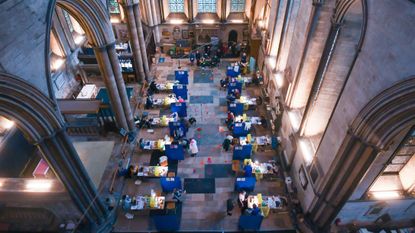
The head of the vaccine taskforce has bolstered optimism over the UK’s jab campaign by saying that every adult in the country could receive both vaccinations by August.
Speaking to Sky News, Clive Dix, who leads the body that identifies and buys vaccines on behalf of the government, said he was confident in the supply of vaccines due to the “portfolio approach” it took to securing Covid jabs.
The UK has secured access to seven different vaccines, with latest Oxford University tracking showing that it has so far administered 16.12 million doses.
Subscribe to The Week
Escape your echo chamber. Get the facts behind the news, plus analysis from multiple perspectives.

Sign up for The Week's Free Newsletters
From our morning news briefing to a weekly Good News Newsletter, get the best of The Week delivered directly to your inbox.
From our morning news briefing to a weekly Good News Newsletter, get the best of The Week delivered directly to your inbox.
1. Over by August
Dix told Sky News that every adult in the UK could receive both doses of a Covid vaccine by August “or maybe sooner if we need to”. He said that he is “confident... that the supply we’re going to get will take to us to a position where we can vaccinate as many people as the UK wants to vaccinate”.
2. Supply will not slow
Having made such a fast start, the question on everybody’s lips is whether “supply issues will cause a fall in the vaccination rate over the next few weeks”, says Politico’s London Playbook.
But Dix moved to allay these fears, saying: “Of course they could have a manufacturing problem, like you do with any manufacture of anything but with vaccines being more complicated, you could have a problem. But because we’ve taken a portfolio approach we’ve got other vaccines that are going to be approved in the very near future.”
3. Tweaking vaccines
The interview also saw Dix “reveal that new vaccines could be approved in just six to eight weeks in the event new variants are discovered, rather than the year it took to get the first vaccines”, Sky News says.
He said that a tweaked vaccine could take “40 days to have it tested in the clinic and know it works”, adding: “Then manufacture would take another period of time because you wouldn’t manufacture huge amounts before you know it works. So it is a short period of time, it’s not waiting a year like we did this time.”
How vaccines can be ‘tweaked’ to combat new Covid variants
4. Early data is promising
The taskforce boss said all the early data suggests the vaccines are as effective as the government hoped.
“It’s looking like these vaccines are doing exactly what we expect,” he said. “Infection rates are going down, hospitalisations are going down and people are remaining - I wouldn’t say virus-free, because we don’t know that - but we know that they’re not getting serious disease. That’s what we were trying to do.”
How many people need to be vaccinated to get life back to normal?
Create an account with the same email registered to your subscription to unlock access.
Sign up for Today's Best Articles in your inbox
A free daily email with the biggest news stories of the day – and the best features from TheWeek.com
Chas Newkey-Burden has been part of The Week Digital team for more than a decade and a journalist for 25 years, starting out on the irreverent football weekly 90 Minutes, before moving to lifestyle magazines Loaded and Attitude. He was a columnist for The Big Issue and landed a world exclusive with David Beckham that became the weekly magazine’s bestselling issue. He now writes regularly for The Guardian, The Telegraph, The Independent, Metro, FourFourTwo and the i new site. He is also the author of a number of non-fiction books.
-
 'Republicans want to silence Israel's opponents'
'Republicans want to silence Israel's opponents'Instant Opinion Opinion, comment and editorials of the day
By Harold Maass, The Week US Published
-
 Poland, Germany nab alleged anti-Ukraine spies
Poland, Germany nab alleged anti-Ukraine spiesSpeed Read A man was arrested over a supposed Russian plot to kill Ukrainian President Zelenskyy
By Peter Weber, The Week US Published
-
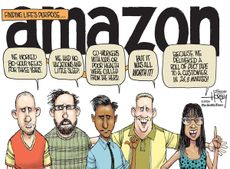 Today's political cartoons - April 19, 2024
Today's political cartoons - April 19, 2024Cartoons Friday's cartoons - priority delivery, USPS on fire, and more
By The Week US Published
-
 Covid four years on: have we got over the pandemic?
Covid four years on: have we got over the pandemic?Today's Big Question Brits suffering from both lockdown nostalgia and collective trauma that refuses to go away
By Chas Newkey-Burden, The Week UK Published
-
 The hollow classroom
The hollow classroomOpinion Remote school let kids down. It will take much more than extra tutoring for kids to recover.
By Mark Gimein Published
-
 Excess screen time is making children only see what is in front of them
Excess screen time is making children only see what is in front of themUnder the radar The future is looking blurry. And very nearsighted.
By Devika Rao, The Week US Published
-
 Covid-19: what to know about UK's new Juno and Pirola variants
Covid-19: what to know about UK's new Juno and Pirola variantsin depth Rapidly spreading new JN.1 strain is 'yet another reminder that the pandemic is far from over'
By Arion McNicoll, The Week UK Published
-
 Long-term respiratory illness is here to stay
Long-term respiratory illness is here to stayThe Explainer Covid is not the only disease with a long version
By Devika Rao, The Week US Published
-
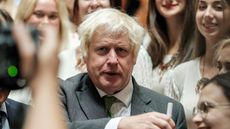 Covid inquiry: the most important questions for Boris Johnson
Covid inquiry: the most important questions for Boris JohnsonTalking Point Former PM has faced weeks of heavy criticism from former colleagues at the public hearing
By The Week Staff Published
-
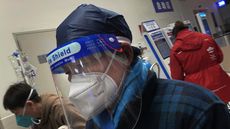 China's pneumonia cases: should we be worried?
China's pneumonia cases: should we be worried?The Explainer Experts warn against pushing 'pandemic panic button' following outbreak of respiratory illness
By Keumars Afifi-Sabet, The Week UK Published
-
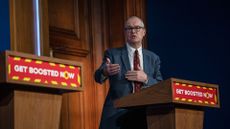 Vallance diaries: Boris Johnson 'bamboozled' by Covid science
Vallance diaries: Boris Johnson 'bamboozled' by Covid scienceSpeed Read Then PM struggled to get his head around key terms and stats, chief scientific advisor claims
By The Week UK Published